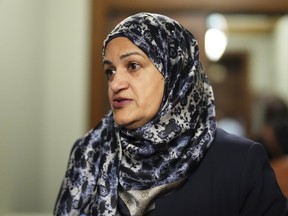Republicans Intensify Focus on Transgender Kids in 2024 Campaign
GOP’s 2024 Campaign: The Spotlight on Transgender Issues
As the countdown to the 2024 elections begins, one thing is crystal clear: Republicans are ramping up their focus on issues surrounding transgender kids. This isn’t just an offshoot of the healthcare debate or a small corner of social policy; it’s becoming a focal point that’s shaping not only campaign strategies but also their broader messaging. Let’s dive into why this issue is at the forefront and how it’s playing out in the big political picture.
Understanding the Landscape
Transgender rights have surged to prominence over the last few years, not only in public discourse but also as a driving force in policy-making. By zeroing in on transgender youth, particularly around the topics of healthcare access and sports participation, Republican candidates are framing their arguments in a way that resonates with a segment of voters who are increasingly concerned about what they perceive as the erosion of traditional values.
So why is this issue so potent for the GOP?
The Emotional Appeal
First off, let’s face it: the issue of children, particularly those who are perceived as vulnerable, sparks emotion. Parents have a natural instinct to protect their children, and the GOP is tapping into that instinct. By highlighting the perceived risks associated with transgender healthcare, Republicans aim to create a narrative that resonates deeply with families who might feel overwhelmed by societal changes.
Imagine this scenario: a parent at home, grappling with the pressures of raising a child in a world that feels increasingly complex. When they hear candidates championing the idea of protecting children from medical procedures they don’t fully understand, it strikes a chord. Is it so surprising that this emotional current drives voters to the polls?
The Rhetoric Shift
Now, let’s talk about the rhetoric. For a while, the language around transgender issues was seen as relatively neutral—advocates pushing for rights and protections, while opponents expressed concerns. But now, we’re witnessing a stark shift. Republican candidates are using language that underscores a narrative of urgency and danger. Phrases focusing on “protecting kids” and “safeguarding parental rights” dominate their speeches.
This shift uses stark contrasts to explain complex ideas in simple terms. It pulls the emotional levers rather than delving into the nuanced debate that many advocates prefer. After all, how can you argue against wanting to protect children?
The Impact of State-Level Legislation
As the primary season heats up, state-level legislation surrounding transgender issues also comes into play. Many Republican-led states have already enacted laws aimed at regulating transgender youth’s access to gender-affirming care, participation in sports, and even the discussion of gender identity in schools.
These laws don’t just serve as a campaign backdrop; they help create a tangible political reality that candidates can point to as progress should they win more governorships or legislative seats. Candidates can boast about their role in these changes as if they’re achieving something for the “greater good” of society. It’s a tactical play, one that the GOP is clearly counting on.
Navigating a Divided Audience
However, navigating this contentious issue isn’t without its intricacies. Not all Republicans are on the same page when it comes to how they want to approach transgender issues. There are moderates who may prefer a more nuanced approach, focusing instead on mental health and well-being. Then there are the hardliners, who view the push against transgender rights as critical to their identity and platform.
The challenge lies in finding common ground. For candidates, the ability to appeal to both sides of their party’s base can be crucial. How do they craft a message that energizes the base without alienating moderate voters?
The Role of Media & Misinformation
In today’s digital landscape, social media platforms amplify messaging and make it easier for misinformation to spread like wildfire. As candidates rally their supporters, they’re also combating a narrative that challenges their stance. The right has found effective means of navigating this terrain, using memes and sound bites to sway opinion quickly. Think of it as political guerrilla warfare—fast, adaptable, and sometimes ruthless.
To many voters, the information they consume on social media becomes their reality. Misinformation about transgender issues can perpetuate fears and reinforce biases. For instance, false claims about the effects of gender-affirming care can generate intense debates, overshadowing scientific consensus.
Engaging Voter Emotions
Let’s be real; emotions are a powerful driver in politics. The GOP is aware that connecting emotionally with voters can be a game-changer. Telling compelling stories of families who are “fighting” against the “threat” to their children taps into those raw feelings many parents experience.
Now imagine seeing a heart-wrenching ad featuring a parent discussing their fears about the policies affecting their child’s well-being. The added layer of personal storytelling makes the issue even more relatable and immediate, thus creating a sense of urgency.
The Bigger Picture
However, Republicans are not just playing a short game aimed at the 2024 election. They are setting the stage for a broader cultural battle. The emphasis on transgender issues is concurrently taking place alongside other pivotal debates revolving around education, healthcare, and parental rights.
By framing these issues as fights for families, they create a comprehensive narrative that aligns various policy positions, casting the GOP as the defenders of family values against ever-deepening social changes.
The Future of Transgender Advocacy
While the current political landscape may seem daunting for those advocating for transgender rights, it’s essential to remember that politics are cyclical. Advocacy communities are already mobilizing to counteract the narrative being laid forth by the GOP. Grassroots organizing, collaboration with sympathetic lawmakers, and a focus on sharing positive stories about transgender individuals are all vital components of the fight.
This is a reminder that activism is not just a response but a strategy. The importance of continuing education and visibility cannot be overstated. As the 2024 race heats up, those who stand for inclusion will need to elevate their voices, ensuring that the conversation encompasses the true complexities of human identity and experience.
Conclusion
The Republican focus on transgender issues in the 2024 campaign is a multi-faceted strategy designed to mobilize voters through emotional appeal and legislative action. As this issue continues to gain momentum, it reveals deeper divides and larger cultural themes at play in American politics.
Being informed about these narratives and forming open dialogues can empower voters to engage meaningfully in this discussion, shaping how we address and understand the complexities of transgender rights and youth.
FAQs
1. Why are Republicans focusing on transgender issues in the 2024 campaign?
The GOP is utilizing transgender issues to resonate emotionally with voters, viewing it as a way to assert their stance on family values and parental rights.
2. How are state-level laws affecting transgender youth?
Many Republican-led states have enacted laws that limit transgender youths’ access to healthcare and participation in sports, which serve as focal points in the GOP’s campaign messaging.
3. What are the implications of misinformation regarding transgender issues?
Misinformation can skew public understanding and deepen societal divides, often fostering fear and misunderstanding about transgender individuals and their needs.
4. How can advocacy groups counteract negative narratives about transgender rights?
Through grassroots organizing, collaboration, and sharing positive stories, advocacy groups can work to create a more inclusive dialogue that accurately represents transgender experiences.
5. Will the focus on transgender issues help or hurt Republican candidates in the long run?
The impact will ultimately depend on how well candidates can balance their messaging while engaging with broader, more moderate audiences without alienating their base.







